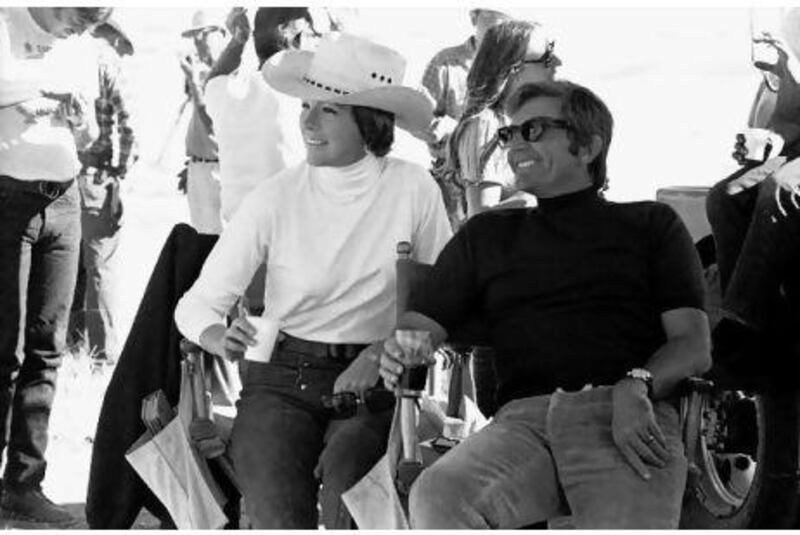Inspector Clouseau asks an ancient hotel manager at the front desk, "Does your dog bite?" The old man replies, "No" and Clouseau proceeds to pat a dog lying in the foyer. It savages him. "I thought you said your dog did not bite?" asks the inspector. The manager responds: "Zat is not my dog."
This scene of Peter Sellers from The Pink Panther Strikes Again underscores the comic brilliance of the writer-director, Blake Edwards, that sustained a Hollywood career, which began in 1948 and ended with an honorary Oscar in 2004.
Born William Blake Crump in Tulsa, Oklahoma, he never knew his father, who deserted his mother before his birth. When he was three, she married Jack McEdwards, an assistant director and production manager (and himself the son of J Gordon McEdwards, the director of more than 50 silent films).
Young Blake joined them in Hollywood and would take most of his stepfather's surname. After leaving Beverly Hills High School, he played small roles in films, then, as the United States entered the war, he joined the coastguard.
A drunken escapade - diving into a shallow pool - left him in traction for five months and, in a scene of delicious irony that any Edwards fan would appreciate, the first lady, Eleanor Roosevelt, visiting the hospital asked how he had been wounded.
A few more minor film roles followed the war until, with a friend John Champion, he wrote and produced a western, Panhandle (1948). They wrote another western, Stampede, the following year.
He wrote a radio series, Richard Diamond, Private Detective for the actor Dick Powell and then a television series for him. Another television detective series, Peter Gunn, appeared in 1959, significant for the fact it was his first collaboration with the composer Henry Mancini.
In 1952 he joined Columbia and co-wrote screenplays for Mickey Rooney. In 1953 (the year he married Patricia Walker) he directed his first screenplay, Bring Your Smile Along, starring Frankie Laine. A string of Tony Curtis films followed, the most successful of which was the comedy Operation Petticoat, co-starring Cary Grant.
The commercial success of this afforded the chance to direct an adaptation of Truman Capote's novel, Breakfast at Tiffany's (1961). Starring the luminous Audrey Hepburn and featuring a beguiling score by Mancini (whose "Moon River" won him an Oscar), the film has become a classic.
Days of Wine and Roses, a powerfully grim portrayal of alcoholism starring Jack Lemmon and Lee Remick and earning them both Oscar nominations was a surprising departure that reflected Edwards's versatility.
He returned to comedy in 1963 with The Pink Panther, the first of a series of eight films, written and directed by Edwards, featuring a bumbling French detective, Inspector Clouseau. The combined genius of Edwards and Sellers, particularly in the first few of the six films in which he appeared, produced an iconic figure in the history of film comedy.
It also proved to be a tremendous commercial success. The Return of the Pink Panther, the third in the Edwards-Sellers series, grossed US$100 million (Dh367 million) on its release. Their collaboration in The Party (1968) (apparently Elvis Presley's favourite film) with Sellers as Hrundi V Bakshi, was not the popular success of the Panther, but some scenes were worthy of Chaplin.
He worked again with Curtis and Lemmon, whom he considered his favourite comic actor, in The Great Race, with Natalie Wood. The comedy was another flop, however, though it has developed a cult following.
Having divorced his first wife in 1963, Edwards married Julie Andrews in 1969 and in that year he produced and directed her in Darling Lili, a spy thriller-cum-musical. Unlike their marriage, it was not a success. A few more flops followed and he retreated to London and Switzerland, returning to direct three more Panthers.
He returned to form, and popularity, with 10 (1979), a comedy whose title reflected the perfect score given by a middle-aged composer (Dudley Moore) to a beautiful young woman (Bo Derek).
SOB (1981), an acidic satire on Hollywood, was a critical success, which memorably featured a startling Andrews revelation. Victor Victoria (1982), with Andrews as a cross-dressing singer, earned Edwards his only Oscar nomination. He lost but won an honorary statuette in 2004 for his "extraordinary body of work".
He successfully adapted Victor Victoria for Broadway in 1995 and at the time of his death he was working on doing the same with the Pink Panther.
Edwards is survived by Andrews, their two adopted daughters and a son and a daughter from his first marriage.
Born July 26, 1922; died December 16, 2010.
* The National






